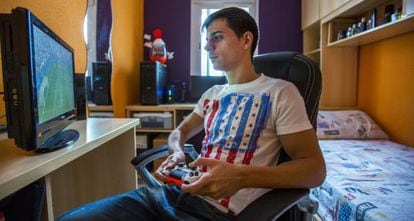Out of the job market at 23 — Spain’s ‘nini’ generation
With youth unemployment so high, how do you motivate youngsters to seek work or study?


José Luis Flores rarely goes to sleep before 4.30am. The 23-year-old has no job, and has never worked. He stays up in his mother’s home in Cádiz watching late-night television long after she’s gone to bed, and then plays video games until the early hours.
He’s a typical example of the 25 percent of Spaniards aged between 15 and 29 known as ninis – the word, derived from the Spanish phrase ni estudia ni trabaja (ni-ni), used to describe those who are neither studying or training, or in work. An Organisation for Economic Co-operation and Development (OECD) report published in September puts the developed world average for youths who are neither in employment nor in education at 15 percent.
Spain fares poorly in the report: 31 percent of Spaniards without a high school diploma are out of work, compared with an OECD average of 15 percent, while 20 percent of those who did graduate from high school are also unemployed, compared with an OECD average of 16 percent. At the same time 23 percent of university graduates are jobless, compared with a developed world average of 13 percent.
Even with an education, Flores would have little chance of finding work in Cádiz, which has the highest unemployment rate in Spain: 42.4 percent, compared with a national average of 24.4 percent. Joblessness among the under-25s there is 69.2 percent.
Unemployment: the numbers
The Andalusia region and, within that, Cádiz province have the highest unemployment rates in Spain.
Cádiz city: 37.16 percent
Cádiz province: 42.50 percent
Andalusia 34.74 percent
Spain: 24.47
Cádiz also has one of the highest youth unemployment rates in Spain at 69.2 percent, compared with a national average of 53.12 percent.
He says he stopped looking for work three years ago, and is no longer even registered at his local employment center. He says he inquired about training courses there a month ago, and has received no reply. “I don’t see them coming up with any help for me,” he says resignedly, adding that his only hope is finding a position through friends or family.
Mara Cuadrado, a family psychologist, highlights the role parents can play in preventing young people from losing hope: “It’s essential to stop them from just sitting around doing nothing. They have to understand the importance of keeping trying, or training, or going to job interviews. If it comes to it, they should go abroad: anything rather than just giving in.”
Amado Benito, a child psychologist, goes further, recommending a tough-love approach: “The people around them have to make it clear that it is only by making an effort that things change. If young people are given help, they won’t struggle, they give in: they have to understand that survival is about fighting.”
Manuel García Sedeño, a psychologist and lecturer at Cádiz University, blames local authorities and the government for failing to come up with solutions to help young people like Flores: “I am a great believer in occupational training: courses with a specific goal, like house building, which are great motivators.”
Flores has three friends of the same age in the same situation: all have managed to find temporary work: one worked in his father’s bar, another found employment in the shipyards, while the other has an uncle who runs a security firm. All say they believe they will find work again.
Meanwhile, Flores spends most of his time at home, going to bed late, getting up late, and watching a lot of television. He occasionally ventures out, maybe to play soccer with friends, or to the local gym, but he says he can’t be bothered to search for work: “What’s the point? I feel ashamed, lazy; the future looks bleak. No work, no studies, how about that? But I don’t want to think about it.”
The people around them have to make it clear that it is only by making an effort that things change” Child psychologist Amado Benito
Like most ninis, he survives thanks to his family. His mother, Mari Carmen, a cheerful, outgoing 53-year-old divorcée pays his gym fees, as well as buying him the latest PlayStation. “He’s not a big spender,” she says. He wears fake designer trainers and drinks Pepsi instead of Coca-Cola: “Every little helps.”
He has no interest in politics (“I voted once, but I can’t remember which party it was for”), although he hopes that new left-wing grouping Podemos will improve things. His mother says she’s given up on politics: “We have had them all in charge in Cádiz, and they are all the same. I’d vote for Podemos, they’re the ones I trust most.”
Flores waits for his mother to get in at 10.30pm to prepare his evening meal, which the pair eat as they watch television: “It’s impossible to have any hope in Cádiz,” she says munching on a sandwich while her son tucks into a pizza. “There is no industry left here, and I can’t imagine my son working as a plumber or a builder,” she adds.
Flores, who has developed a bodybuilder’s physique thanks to his twice-weekly workouts, says he’d like to be a gym monitor or work as a security guard. “Young people have no vision any more. If my son did, he’d get up off the sofa: a girlfriend, a job, something to get him out of bed in the morning. But he’s not exactly motivated is he?” says his mother.
Around midnight, Flores goes to his room, where he spends the next four hours playing online soccer – his only concern winning enough points to buy a decent player.










































